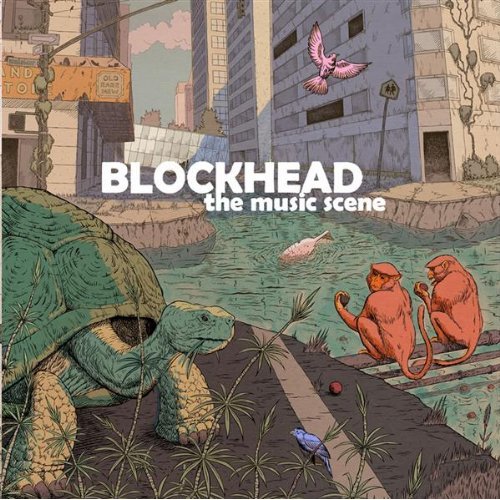My first date with Blockhead’s music happened sometime in 2007. I had been courting instrumental hip-hop and electronic music, testing out which artists produced music that clicked with me. Someone set me up with Blockhead’s Uncle Tony’s Coloring Book, which was very new to music at the time. Regardless, it was self-released, and people generally had good things to say about Blockhead. I decided to give him a chance.
Blockhead and I had a very nice date. We isolated ourselves, I listened attentively to everything he had to say on Uncle Tony’s Coloring Book, but for some reason, we just didn’t click. I felt like perhaps Blockhead was trying too hard to be like DJ Shadow, the cool producer in town, and he was failing. I gave up on him and steadfastly decided that if he wanted to win me over, he would need to show me more of his own personality through his music.
Fast forward to the present, and Blockhead comes out of nowhere in 2009, releasing The Music Scene (Ninja Tune). After all these years, he is still trying to get my attention (persistent guy), so I give him another chance. It turns out he’s finally beginning to come into his own with The Music Scene, letting his skill and growth shine. No question about it; he has gotten my attention. I’m listening, Blockhead.
The album can best be described as an exercise in texture. Granted, texture has always been present in Blockhead’s work, but this time, his approach is more finely-tuned on this album than on anything he’s done before. It is an “exercise” because The Music Scene is not likely to be his magnum opus, and perhaps it will never be anyone’s favorite hip-hop/electronica album. Still, it is an important step in the right direction for Blockhead, and that stands for something.
The opening track, “It’s Raining Clouds,” is a hard-hitting track that sets the tone for the album. It comes complete with a bumping bassline, an indecipherable soul/R&B sample, voice clips, tambourine samples, and unexpected tempo changes. That probably seems overcrowded and muddled, but Blockhead successfully pulls off the sonic pile-up and makes it feel like a track that unfolds slowly, pulling out all the stops to refrain from redundancy.
Tempo changes are a constant in The Music Scene, and appropriately, he employs them in the title track to great success. The infectious ‘60s-sounding vocal sample laments, “The music scene / has got me down / ‘cause I don’t want / to be a clown,” almost as though this humbug declaration is the centerpiece, perhaps indicative of Blockhead’s attitude and approach during the album’s conception.
There is a slight change of pace on “Only Sequences Change,” building the track on samples of mellow guitarwork instead of brash beats, but it’s still a hard-hitter, especially around the 2:20 mark. This slower pace gets repeated on the track “The Prettiest Sea Slug,” a waltzy composition that also uses interesting guitar samples. “The Daily Routine” is likely the most memorable track on the album, and in stark contrast to a happy, dreamy song called “Daily Routine” by a certain band whose name starts with Animal and ends in Collective, Blockhead’s song seems to explore the darkness of everyday life, as evidenced by the fierce shouting and arguing heard throughout the track. The song has a moody, lower tone to it, with the guitar and sax samples adding to the sense of melancholy and dysfunction. It certainly leaves a lasting impression on the listener.
Blockhead, fully understanding that the aforementioned track was such a downer, follows it up with the upbeat and lively “Tricky Turtle,” which builds a fun atmosphere using vocal samples in an unfamiliar language, some clapping, and an extremely fun, big brass sample. It’s only a shame that Blockhead has to go downhill from there, not in terms of mood, but in terms of quality. The next three tracks are not as memorable or interesting as the front end of the album, using the same sonic construction as prior songs, but failing to give the songs any striking movements or centerpieces. Considering the majority of the album is so emotionally stirring, I can’t help but scratch my head at the lack of feeling in the album’s latter half. “Four Walls” ends deceptively with a fierce-sounding guitar sample, but it fails to enhance the song or help take the album anywhere substantial. I’ll hand it to Blockhead that the closing track, “Farewell Spaceman,” leaves the listener a bit more satisfied, cleverly (if not predictably) using appropriate vocal samples that send messages of farewell, but it still leaves you wondering how you got so far down the slope from the heights of the opening track.
The Music Scene will certainly help push Blockhead into a more solid position as a legitimate artist with albums that stand apart from his work as a producer for Aesop Rock. Personally, I’m still waiting to see what he does next. At least he’s got my attention now, and hopefully, this album will demand your attention, too.

